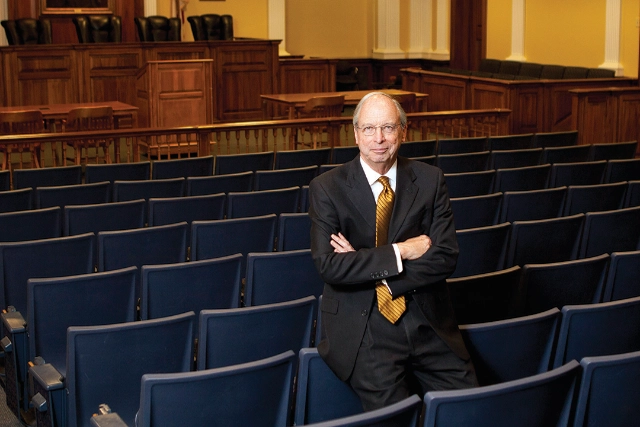
Judge John L. Carroll retired from Samford in the spring after more than two decades of distinguished service to the university, including being dean of Cumberland School of Law from 2001 until 2014. The 1974 Cumberland alumnus has remained on the law faculty since 2014, but now looks forward to having a flexible schedule and more time for reading. He is not planning to set aside his practice of law, however. He will continue the public service he has modeled throughout his career, but is happy to serve in an advisory role now. “I’m ready to not be a leader for a while,” he said.
Reflecting on the changes in law education over the last two decades, Carroll observed that increasingly Cumberland students share his interest in service to people who need assistance. The Cumberland Veterans Legal Assistance Clinic (C-VETS) program Carroll supports as supervising attorney is only one of many opportunities Samford’s law students have for such service. The program, launched in 2020, provides free legal assistance to veterans and their families across the state of Alabama. Carroll, a U.S. Marine Corps veteran, said he might continue to work with C-VETS and the Cumberland students, or he might support some of the program’s other partner organizations.
In addition to a significant orientation toward service, Carroll said today’s Cumberland students are also known for their deep engagement with technology, especially social media. Carroll has developed e-discovery as one of his specialties, so he knows very well the impact of the digital revolution on the practice of the law. He expects upcoming generations of technologically fluent attorneys to build on the rapid changes forced by COVID-19. “The pandemic really has changed some things,” he said. “Talking to judges—they’re far more comfortable having Zoom hearings, where you don’t have to bring lawyers from all over the country into your chambers. A lot of mediations are now being done over Zoom.”
Carroll embraces the efficiency technology makes possible, but he also wants law students to continue mastering the traditional interpersonal communication skills of legal practice. “There are some times when you just want to have that person across the table from you and look them in the eye,” he said. “In my classes, I make the students stand up, like the old days, and talk to me face-to-face, and for some of them that’s a challenge.”
“Samford is a unique place—it really is,” Carroll said as he reflected on these and other changes he has witnessed through four Samford presidential administrations. “It’s a Christian-oriented school but one that’s a convening place for all sorts of different ideas and the exchange of different ideas. I think we have been blessed with a series of really good leaders who understood that, each one fitting the need that the university had at that particular time.”
When Carroll joined the university 20 years ago, he wasn’t sure how his own work would serve. “I had no idea what I was getting into when I came to Cumberland in 2001, and no idea how I, a Roman Catholic trained by Jesuits, would fit into Samford,” he said. “It turned out to be the most wonderful experience I’ve had in employment and personally. It was a great experience, and I’m very, very thankful for the opportunity to serve both the law school and the university.”
This story was originally published in the spring issue of Cumberland Lawyer magazine.
